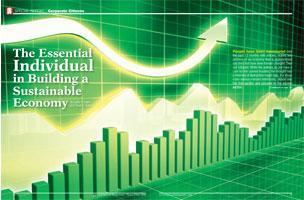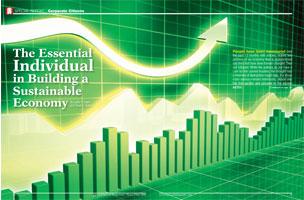
 People have been hammered over the past 12 months with articles, stories and pictures of an economy that is dysfunctional and lives that have been forever changed. They are fatigued. While the authors do not have a cure for the current troubles, the thought was a moment of distraction might help. For those more serious-minded individuals, please skip the introduction and proceed to the next section.
People have been hammered over the past 12 months with articles, stories and pictures of an economy that is dysfunctional and lives that have been forever changed. They are fatigued. While the authors do not have a cure for the current troubles, the thought was a moment of distraction might help. For those more serious-minded individuals, please skip the introduction and proceed to the next section.
Extraterrestrials Don’t Understand
Have you ever wondered what an extraterrestrial being would think about the U.S. economy? Perhaps not, but it is an interesting way to emotionally disengage and take a look at it.
An extraterrestrial being would conduct an initial examination of the economy and would observe that the economy has multiple levels of smaller units which aggregate into a self organized system. The being would also note that the larger more highly organized levels of the economy interact and often compete for control and influence over the system. The being would characterize the behavior of the economy as marginally predictable and subject to temper tantrums. Further observation would result in the recognition that all levels of the economy respond to internal and external stimuli. A review of economic descriptors from various media would lead the being to describe the economy in terms of its health and ability to learn from previous experiences. After analysis of the accumulated observations, the being would of course conclude the economy is a living organism and request a meeting with the economy’s leader. Failing, of course, to understand the significant role those individual units play in the outcomes of the economy.
So what would our extraterrestrial being think about human individuals? Sad as it may seem, human beings would not make it to the being’s consciousness. When pushed to recognize the human element, the being would consider interaction with individuals an inefficient use of time.
The extraterrestrial being would remain on Earth for a period of time continuing to observe the economy. Repeated requests to meet with its’ leader would be met with no response. Ultimately, the frustrated being would depart from Earth having never fully understood the fundamentals of the U.S. economy. Little did the extraterrestrial being know that its frustration would have been greed by humans.
People Underestimate Their Influence
What individuals forget is that their decisions to spend money, to save money or incur debt are frequently replicated by others. The similarity of their behaviors defines a cohort whose impact on the economy increases as the numbers in the cohort increase.
Furthermore, individuals tend to perceive themselves as the recipients rather than initiators of influence in an economy especially when his/her job is at risk or has been terminated. Under extreme conditions (i.e., sustained unemployment), the survival of one’s self and the survival of one’s family focuses all resources on the present moment. When enough people can no longer envision a better tomorrow or lack the belief that future goals can be achieved, economic growth will stall. Re-employment will relieve the acute focus on immediate needs but it does not guarantee resumption of a future vision.
Government in the Role of Hero
Government stepped into the current economic crisis to avoid repeating history, to shore up fragile mega conglomerates and to dampen the amplitude of the unemployment wave. As an investor and visionary, government began focusing tax dollars on large scale infrastructure projects. Public infrastructure was a logical political move because it is an acceptable use of tax payer funds. What is less clear is the link to large scale permanent job creation in both the public and private sector of the economy. In reality, the spending of large sums of money on infrastructure (i.e., the movement of money), is probably as important, if not more important, than the actual jobs created because of the sustained ripple effect. The challenge with infrastructure has always been the extensive planning and implementation time required. The benefit is that projects tend to straddle years.
In the midst of the crisis, government also pursued health care reform as if the list of economic “to do’s” wasn’t challenge enough. The health care debate appeared to be unfinished political business that garnered substantial constituent support, but why the distraction? It now appears to the authors of this article that health care reform is being pursued because it will increase the probability of deficit reduction.
Stated another way, government’s action over the past 18 months has necessitated a great deal of gambling on people, businesses and a future. As the nation’s debt obligation continues to rise, the question of how much debt is acceptable and how will such debt be repaid, is being asked. In reality, significant payback will only be achievable if the vast majority of the population is healthy and driven to succeed. So the discussion surrounding health care may have begun from a political seed but has become a necessity. The strategy won’t work unless individuals adopt a more accountable state of mind. More will be discussed on this topic later.
Individuals Will Invest
People drive economic development through investment. Local communities, which are the recipients of that investment, have historically seen tax revenues rise. Government, in turn, has generally reinvested that tax revenue into community infrastructure. If individual investment suddenly declines, then a community feels the impact through a loss of tax revenue which in turn forces a reduction in government services and staff. The downward spiraling of losses does not change until an upwardly trending reinvestment cycle is established and sufficient time has passed for the tax revenues to catch up.
Individuals do understand that investment in a community’s assets can lead to a return on those assets, but their investment options have broadened to include the global economy. A community must, therefore, compete for an individual’s investment dollars by offering options that appeal to these globally focused individuals. Most of the traditional selling points have focused on education, entertainment and the environment. Today, the list needs to include community attributes that minimize the perceived disparity between ‘here’ and ‘there.’ A list would include such items as: high quality broadband infrastructure, efficient and fast transit systems, a culturally diverse population that welcomes outsiders, and government that is easy to navigate. A community armed with a mindset that accepts change and creatively addresses the new challenges is one that will compete favorably for an individual’s future investment dollars.
Individuals Are Accountable
Health is directly linked to performance, to attitude and to longevity. The dynamics surrounding health changed during the 20th century with the introduction of antibiotics and vaccines. People were no longer dying young in large numbers due to infectious diseases. As the treatments for acute disease continued to expand, changes were also occurring in the growth and delivery of food. Enhanced nutrition, coupled with disease treatment, began to lengthen life spans. Chronic disease such as diabetes and heart disease, along with the increased incidence of cancer, displaced acute disease as the new health challenge.
Medical technology has progressed to the extent that many diseases now have a corresponding cure. For those chronic diseases with a yet undefined cure, research has refined the understanding of the disease and improved targeting of treatment. What has become apparent is that some chronic diseases and cancers are triggered by, or causally linked to, an individual’s living environment and personal habits. It is the group of health problems with a causal link that has recently garnered more public attention.
While the federal government cannot mandate health, it certainly has a vested interest in fostering an attitude in people that strives for improved health. Measures included in this group are physical exercise, the consumption of higher quality food in smaller quantities and prevention screening.
Obesity is one of the biggest chronic problems today and is also (currently) accounting for up to 10 percent of all health care costs (T.R. Frieden, CDC, 2009).In the mid and late nineteenth century being rotund or plump was a sign of wealth. Today obesity symbolizes consumption out of control.
Is the food industry to blame for designing foods that taste good but are nutritionally compromised? Is society to blame for not recognizing the need to adjust lifestyles when jobs shifted from those dominated by physical activity to those dominated by sitting? Are health educators to blame for not driving home the concept that more calories in + fewer calories burned = weight gain? Are health care providers to blame for not stressing the diabetic, blood pressure and joint problems associated with obesity? Are policy makers to blame for ignoring health care issues? Are insurance carriers to blame for their distortion of the health care market? Are we to blame for not setting limits?
Unfortunately, assigning blame does not solve the problem. In 1998 direct medical costs associated with obesity were estimated to be $51.6 billion (CDC, MEPS 1998). That figure today is $147 billion (T.R. Frieden, CDC, 2009) and would be substantially higher if the disabilities associated with obesity and the early deaths caused by it were factored in.
So in an era of watching the dollars, individuals must watch their pounds and actively manage their weight just like they would manage their bills or investments. Once an individual acknowledges the problem, the next step will require change. For some, this will mean increasing their physical activity, and for others this will mean behavior modification.
Sustaining the effort will require positive reinforcement from family, friends and employers. Achieving a sustainable body mass like a sustainable economy will take time and a great deal of effort. Individuals will need to adopt an attitude of accountability. Employers, insurers, policy makers, educators and the food industry will need to adopt new approaches and new strategies which reward weight loss, deter exorbitant weight gain and support a balanced environment.
Individuals Need a Lifetime to Learn
A commitment to learn is more than formal education and the accumulation of degrees. It is an awareness of the world in which one exists, the desire to achieve and the integration of new knowledge into one's daily routine. The ability to learn, and the process of learning, allows an individual to acquire new skills and adopt new technologies, such as a cell phone or a computer. The process also builds confidence needed to try a new technique or a new career field. As confidence builds in one skill area, an individual is more likely to try another. In a world of global competition knowledge and the ability to adapt will fair better over time than being the low cost alternative.
While no one has a crystal ball or time machine to determine what the future will bring, it is important to consider and learn from our experiences and those who have preceded us. The domestic and global economies are volatile mechanisms that are impacted daily by the decisions of individuals, corporations, governments and politics. Education, health and confident investing will have a greater impact on our economic longevity than posturing and habits of excessive consumption. The flexibility that accompanies wise choices and life long learning will allow us to ride the waves of economic change better than any time in our history.

